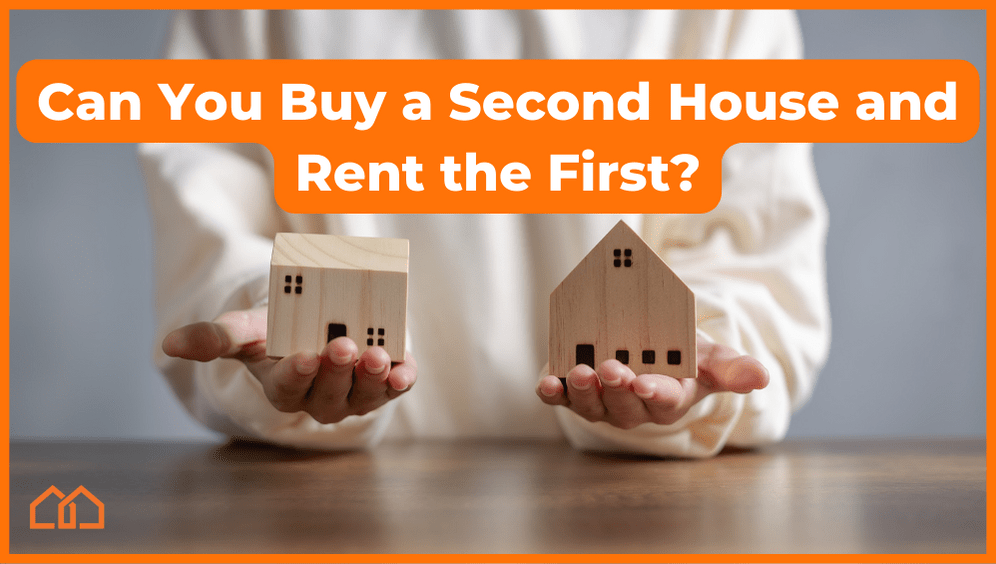Can you buy a second home and rent the first?
Buying a second home while renting the first is an alternative way to move without selling. In a market where it takes around 83 days to sell a home traditionally, a faster option like this can make a difference in your homebuying timeline. In what situations would leasing your home to renters benefit you, and how do you do it?
Why rent your current home and buy a new one?
In this real estate market, there are several reasons why renting your first home can be the better option compared to selling it.
1. The Average Time to Sell a Home Is Longer
According to recent findings, the average time a home is on the market after listing is 83 days. It’s more common to see a home on the market for two months before it gets a good offer. If you can’t wait that long to move, then renting your first home can give you the freedom to make a new home purchase without worrying about a home sale contingency.
- Hot take: Typical lenders want to see a history of rental income in the form of tax returns, which means they prefer 12 months of income in your paperwork. But when you use a program like Guaranteed Lease Agreement, your home gets an automatic financial backing that many lenders will count.
2. Strict Return to Office Timelines
A recent study by Redfin uncovered popular reasons for relocating in 2023. While the majority of reasons had to do with being near family or other personal preferences, a few were not intrinsic. Among the external motivators, more companies are asking employees to return to the office.
Companies issuing this mandate have a set timeline in which employees should be fully relocated near the office to participate in full-time or hybrid schedules. While some deadlines are generous, it is still a challenge to uproot your life, sell your home, buy a new home, and adjust to another location within 6 months to a year. having a timely solution for your current home’s monthly payment is imperative.
3. An Upside-Down Mortgage
Real estate always goes in cycles, and we are once again in a situation where homeowners who want to move are more likely to be stuck because their primary residence is “upside down.” This situation was very common after the housing crash of 2008/2009 after people bought houses at bloated prices. After home values dropped, they owed more on the mortgage than what the home was actually worth.
However, since inventory is still low in today’s market, prices aren’t crashing like they did almost two decades ago. This time, it can be a matter of being upside down by a few thousand dollars and not hundreds of thousands. Renting your home can buy you time to pay down the mortgage and wait things out.
4. Not Enough Equity to Sell
If you need to move out of your first home but don’t have enough equity to make money off the sale, then renting it is a good option to widen the gap between your home’s value and what you owe on the mortgage. This is a common occurrence if someone needs to move within the first five years of buying their home since the first years of mortgage payments are mainly interest.
5. You Bought a House at 3% Interest (or below)
If you bought a house at around a 3% mortgage interest rate, you have an asset. As single-family rental homes are in high demand, you can make decent cash flow on it since the mortgage on your first home would be significantly lower than market rate rent. Taking advantage of the historically high rental rates can provide a significant profit margin, plus you avoid closing costs associated with selling.
Benefits of Renting out Your Home
There are many benefits of renting out your home instead of selling it. Whether you need a faster move-out timeline or to buy time to pay down your first home loan for a few more years, there are quite a few reasons why homeowners choose to lease their home:
- Grow Wealth: You can build equity through rental income, paying your first monthly mortgage at no cost to you – doubling your wealth growing potential.
- Tax Benefits: You continue to get tax breaks from your first home, increasing profit from rental income.
- Profit: The margin between the first home’s mortgage and its higher rent can help fund payments toward your second property.
- No Vacancy Problems: Occupied homes will help you avoid maintenance costs associated with vacant homes, like pests and overgrown yards.
- No Need to Lose Money if You’re Upside Down: Why sell at a loss when you can rent for a gain? Then, when your property can be sold for a profit, you can sell and make money off your first home.
- Intergenerational Wealth: You can keep property in your family and build a legacy.
- You Have a Backup Home: If plans change in the future, you have a home that you can move back into.
- Gateway to Investing: If you’ve been interested in real estate investing, renting your first home is a soft way to start and find out if you want to become a career property owner.
First-time landlords can feel overwhelmed at the thought of renting their home, but working with a real estate brokerage that specializes in leasing and property management makes it so much easier. They market and fill your home, collect rent payments,
How to Get Rental Income to Count when Applying for a Second Mortgage
According to ValuePenguin (one of my favorite sources of financial information), mortgage lenders have different conditions to make rental income count. However, if your current financial situation makes it impossible to qualify for a second mortgage without including your rental income, then you need to get your lender to see it as a valid source of guaranteed income. To assist with this process, lenders need to see:
- As much proof of past rental income as you can provide. This can be in the form of bank statements, receipts of rental payment, and tax returns.
- For new rental properties: Solid proof of potential earnings of the property, such as a signed 2-year lease.
Each lender has different standards for what qualifies as enough proof of past or potential income, but overall, the more documentation and guarantees you can provide, the better. For example, two years of tax returns with proof of rental income should be more than enough.
It’s harder to prove rental income when the lease is new or pending. In this case, having a financial guarantee beyond “these people will be moving in” is important. Marketplace Homes’ Guaranteed Lease Agreement program helps you skip the line and provide paperwork with guaranteed rental income even if the lease is new or upcoming.
How do I buy a second home and rent the first?
To buy a second home and rent the first, you need to either qualify for a second mortgage or buy the second home with cash. The more money you have, the easier it is to qualify for a second mortgage. A history of consistent rental income or another form of financial guarantee is important to give lenders the confidence to count your rent as reliable income. This allows you to count your first home as an investment property for which you’re not actively paying the mortgage.
In the landscape of higher interest rates, second-home borrowers need to bring more to the table. To qualify for a second mortgage, you typically need to pay a higher down payment than the bare minimum and be prepared for steeper financial qualifications. Make sure your debt-to-income ratio and credit score are the best they can be, and it always helps to have as much money in the bank and other collateral as possible.
Should I buy a second home as an investment strategy?
Buying a second home is an investment strategy that many landlords use to start out. If you’re interested in buying a second home as an investment and staying in your first home, then you can use a home equity line of credit (HELOC) to help fund your acquisition.
Whether you want to rent your home, buy a new construction home, or sell an existing home, Marketplace Homes is here for you.
Alicia Persson is a Content Strategist SEO writer at Marketplace Homes, utilizing previous years of experience on real estate teams that specialized in investments and property management. Before she joined Marketplace Homes, she was also a freelance writer for 7 years, leading to a specialization in real estate and home living content for boutique digital marketing agencies. During her writing years, she learned the basics of SEO and gained experience writing for many different clients, making her versatile at creating diverse content.
She is a proud University of Virginia master’s graduate and enjoyed her undergraduate years at the University of Mary Washington. When Alicia is not writing, she plays keytar and sings in a local 90’s rock cover band, or she spends time with her amazing family.


